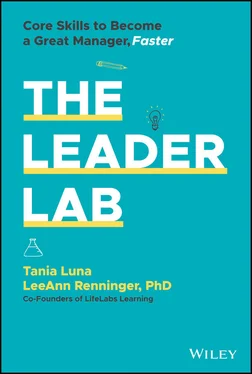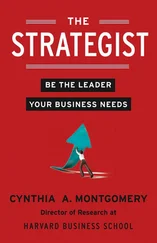The long-debated distinction between leaders and managers is also growing obsolete. It used to be said that leaders handled the unknown, while managers handled predictable work. It was once believed that leaders guide others through influence, while managers control through authority. While leaders don't have to be managers, nowadays managers must be leaders. For this reason, we'll use the terms “manager” and “leader” interchangeably throughout this book and equip you with skills to manage and lead well. So, if you want to become a great manager faster, where should you start?
The Surprising Skills That Matter Most
Great Managers, Assemble!
Consider this: in a 10-minute exchange with one person, a manager uses hundreds of words, microexpressions, and gestures. Which of these behaviors result in a team member who's productive and engaged and which result in the opposite? When we began our mission to help people become great managers faster, we couldn't separate the signal from the noise. So we thought back to the Martas, Johns, Bernardos, and Nikos. We wondered: can we learn directly from these leadership legends? Thanks to this insight, we assembled our first group of research participants.
At LifeLabs Learning, we had the unique opportunity of training people at many different companies around the world. So, every time we went into a company to lead workshops, we asked, “Who here is a great manager?” The people who were named again and again had the most engaged teams and a track record of achieving results. We also compared these “greats” with average managers. Our initial plan was to conduct interviews with the greats and the average, and look for differences in their answers. To make a long story short, this approach was mostly … a flop. When we asked managers which behaviors led to their success, the answers of the great and average folks were not predictive of performance. For example, guess which type of manager (average or great) most often said, “I think it's important to be a good listener.”
The answer? Nearly every manager talked about the importance of listening. So what actually made the greats different? We interviewed the managers’ teams to see if we could gather more helpful data. This approach yielded some interesting insights. For example, we learned there was no correlation between managers believing they were good listeners and their team members rating them as good listeners. But we were still no closer to understanding the behaviors that distinguished great managers.
You see, one of the challenges with studying management is that it is a uniquely private practice. Nearly all exchanges happen behind closed doors, whether physical or virtual. So, as our next plan of action, we wanted to see if managers would open their doors to us. We asked if we could watch them share feedback, lead meetings, and give pep talks. We wanted to recreate the “black box” of the aviation world – the recording device that has enabled countless improvements in flight crew dynamics. Surprisingly, many said yes. (And to them, we are eternally grateful.) As a result, we got to sit in on one-on-ones and team meetings, as well as solo working sessions where we asked managers to “think out loud” as they made complex decisions. With the black box open, we were able to observe their behaviors in action.
When we began our research on what makes great managers different, we started with the implicit premise that it is the big behaviors that count. Without realizing it, we were waiting for something cinematic to happen. We wanted to get goosebumps and imagine an orchestral crescendo while hearing an inspiring speech. What we found instead were behaviors so small we barely noticed them. But there they were, distinctly standing out again and again in the “black boxes” of the great managers. Even though these leaders came from different industries, professions, and cultures, they had a small set of small behaviors in common.
Discovering Behavioral Units
We've come to call each small behavior we observed a Behavioral Unit (or BU for short). No, they are not dramatic, but they are so elegant in their simplicity that they do give us goosebumps. We began to spot them in casual conversations, in times of conflict, and in every meeting. Even in the midst of our own debates about what makes great managers different, we'd stop one another and say, “Hey, nice BU!” Now that these BUs were visible to us, they were impossible to unsee. Once you learn them, you too will start to spot them everywhere.
The Manager Core: Your Leadership Swiss Army Knife
Once we learned how important BUs are, we thought we had our research breakthrough. Then, we realized something even more exciting: not all BUs are created equal. While great managers exhibit dozens of BUs, there is a foundational set of seven that come up in more contexts than any other. We call these the Core BUs. They are the small but mighty behaviors we will focus on in Part Iof this book. What are these tiny champions of the leadership world? We are proud to present each one, chapter by chapter:
Chapter 1: Q-step
Chapter 2: Playback
Chapter 3: Deblur
Chapter 4: Validate
Chapter 5: Linkup
Chapter 6: Pause
Chapter 7: Extract
Once you are familiar with the Core BUs, you will be ready to graduate to Part IIof this book, which is based on our most popular workshops at LifeLabs Learning. In each chapter, we will show you how to string various BUs together to form the eight Core Skills of great managers.
While BUs are micro-behaviors, skills are packages of different BUs and tools mixed together to help you handle an even broader range of obstacles and opportunities. As an analogy, think of knowing the alphabet as a BU and of writing as a skill. Based on our manager research, we found that, just as not all BUs are created equal, not all skills are equally versatile. So, in Part II, we'll bring you only the skills we refer to as the “tipping point skills.” These are the skills that “tip” over into the widest number of domains, making the biggest impact in the shortest time. What are these famed Core Skills? Drum roll please … the skills you will be learning throughout Part IIof this book are:
Chapter 8: Coaching Skills
Chapter 9: Feedback Skills
Chapter 10: Productivity Skills
Chapter 11: Effective One-on-Ones
Chapter 12: Strategic Thinking
Chapter 13: Meetings Mastery
Chapter 14: Leading Change
Chapter 15: People Development
Think of the Core BUs as your leadership Swiss Army knife. A single Swiss Army knife has a small set of tools, and yet this finite set alone will let you open canned foods, start a fire, make repairs, defend yourself, trim your nails, remove splinters, and infinite other things. In the same way, the Core BUs will get you through just about any leadership challenge and fit neatly into the pocket of your memory. Each time you learn how to use different Swiss Army knife tools to achieve a result, you learn a new skill. That's what the Core Skills throughout this book will help you do: rapidly combine different BUs and tools to become a great manager faster.
So, let's get into it. We'll now move away from our telescopic view of managers and saunter over to the microscope. We'll zoom in on the specific behaviors of great managers, sharing behavioral science research along the way. But this deep dive into research is not the only reason this book is called The Leader Lab . Yes, we will bring you lessons from our laboratory and from leadership labs across the world, but the most important lab we will focus on is yours .
Читать дальше











